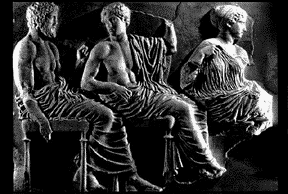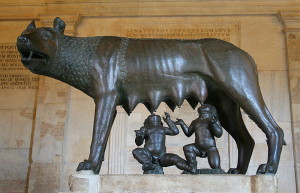Ancient Myths That Forged Italy
Posted on September 24th, 2013 by Anna in Uncategorized | No Comments »
As a culture that dates back thousands of years, Italy has a rich wealth of folklore and legends. While the country is primarily Roman Catholic now, ever since Constantine mandated that the Roman Empire convert to Christianity in 313 AD, the ancient Romans had a diverse and colorful mythology, influenced both by Ancient Greek and the Etruscan stories.
The Roman pantheon of pre-Christian gods was based almost entirely off of the Greeks’ but translated into Roman names. At the dawn of time, so the stories went, Saturn was the ruler of the universe and, fearing a prophecy that one of his children would overthrow him, he devoured his offspring. Finally his wife gave him a stone to eat instead of his youngest son, (Saturn was not too observant for being ruler of the universe,) and when the boy, Jupiter, grew up, he deposed his father, freed his siblings, and took his place as king of the gods. His older sister Juno he made his queen (they were gods—they could do what they liked,) and the rest of his brothers and sisters he appointed as heads of various realms. Neptune became the god of the sea, Ceres became the goddess of the harvest, Vestia became the goddess of the hearth, and Pluto became the god of the underworld.
To Juno’s dismay, Jupiter went on to have affairs with many women, peopling the ancient world with more gods, demigods, and heroes. A second generation of gods, mostly sons and daughters of Jupiter, came into being: Minerva the goddess of wisdom, Mars the god of war, Mercury the messenger god, Apollo the god of music, his twin sister Diana the goddess of the hunt, and Bacchus the god of wine. The only younger god not in some way related to Jupiter was Venus, the goddess of love, who according to legend came into being, a miscegenation of dawn light and sea foam. Another of Jupiter’s famous offspring was the hero Hercules, who spent his life being tormented by the vindictive Juno. Outraged that her husband would favor his son by another woman, she struck Hercules with a madness that caused him to see his wife and children as wild animals. After killing them all in a frenzy, Hercules had to perform twelve labors of atonement which earned him fame and prestige throughout the ancient world.
Aside from the tales of the gods, perhaps the most famous Roman myth is that of Romulus and Remus, twin sons of Numitor, the king of the region, abandoned at birth in the river Tiber to save them from being murdered by their uncle. They were rescued by a she-wolf and then raised to manhood by a shepherd and his wife. Once they discovered their true identities, they raised an army, killed their uncle, and restored their father to his throne. Deciding to head off and found a new city to rule, they disagreed over where the city should be built. Romulus killed his brother, built the city on the Palatine Hill, and named it after himself: Rome.
While these myths are thousands of years old, they still prove to have an important influence. The planets, obviously, are named after the Roman gods, with Jupiter, the largest, being named after the king, as well as a handful of elements. The Roman gods and legends proved to be a favorite subject of paintings, sculpture, and literature throughout the middle ages and the Renaissance, and are still reinterpreted in books and movies today. A testament to the creativity and imagination of the ancient Romans, they are timeless stories that will continue to entertain readers for years to come.






